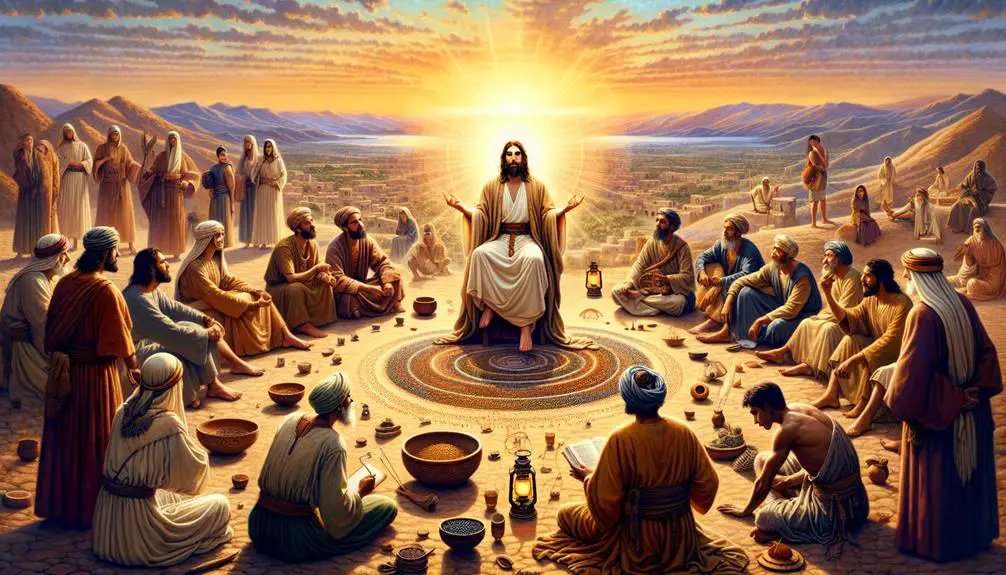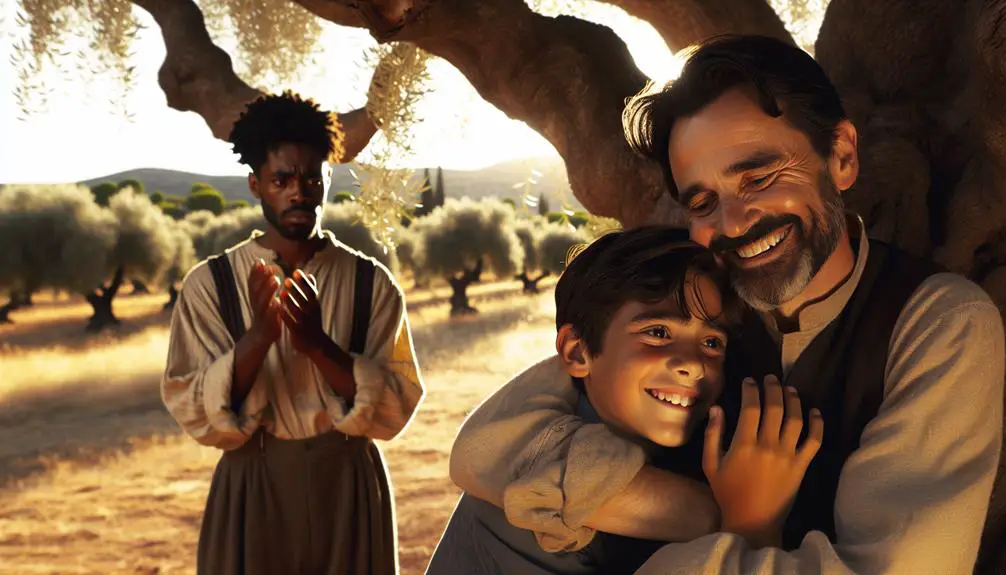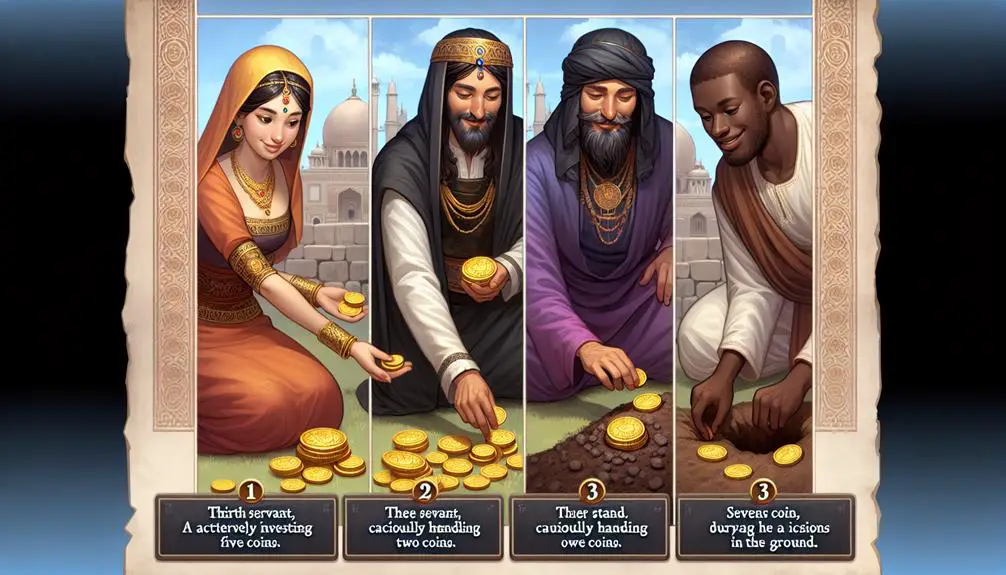Gain insight into life's profound lessons through the Bible's best parables, and discover which timeless story resonates with you.

Best Parables in the Bible
You might think you know the parables of the Bible inside out, but each reading can offer new insights. From the Good Samaritan to the Prodigal Son, these stories are not just ancient texts but lessons that resonate through time. They challenge societal norms, highlight moral dilemmas, and inspire acts of kindness.
As you consider the depth of the Mustard Seed or reflect on the Sower's challenges, you're invited to explore how these timeless narratives can influence your daily life. Let's start a conversation about which parable speaks to you most profoundly and why it stands out in a collection of such impactful teachings.
Key Takeaways
- Parables like The Good Samaritan redefine compassion, challenging societal norms on who deserves empathy.
- The Prodigal Son emphasizes forgiveness and redemption, highlighting the strength of familial bonds.
- The Mustard Seed symbolizes faith's potential for growth from small beginnings, stressing the importance of a nurturing environment.
- The Sower teaches about spiritual receptiveness, encouraging individuals to cultivate their hearts and minds for growth.
The Good Samaritan

The parable of the Good Samaritan cuts to the heart of ethical behavior, challenging you to reconsider your understanding of neighborly love and compassion. This narrative isn't just a biblical tale; it's a cornerstone that has significantly influenced cultural norms and sparked ethical debates across centuries. At its core, the parable transcends religious boundaries, urging you to question the societal constructs of duty, kinship, and morality.
The cultural impact of the Good Samaritan is profound. It's woven into the fabric of legal systems through laws named after the parable, designed to protect those who aid others in distress. This legal embodiment encourages societal acts of bravery and kindness, reinforcing the parable's message in contemporary life. Moreover, the story is a staple in educational settings, used to instill values of empathy and altruism in young minds.
In the realm of ethical debates, the Good Samaritan serves as a pivotal reference point. It prompts you to examine the limits of moral obligation and the nature of altruistic behavior. Scholars and ethicists have dissected the parable, debating the extent to which individuals should go to help a stranger. Is the Samaritan's action commendable or expected? This question challenges entrenched notions of self-preservation and selflessness, pushing for a broader, more inclusive definition of community.
In essence, the Good Samaritan parable doesn't just offer a lesson in kindness; it provides a lens through which you can explore complex ethical dilemmas and their implications on modern society. Its enduring relevance underscores the timeless nature of its message, compelling you to reflect on the depth of your compassion and the breadth of your humanity.
The Prodigal Son

In exploring the parable of the Prodigal Son, you're invited to delve into themes of forgiveness, redemption, and the unconditional nature of familial love. This narrative not only captures the essence of family reconciliation but also subtly addresses economic implications inherent in its storyline. It's a profound reflection on the dynamics of forgiveness and the capacity for renewal within familial relationships.
The story portrays a younger son demanding his inheritance early, squandering it, and returning home in shame, only to be welcomed with open arms by his father. This act of unconditional love and acceptance from the father towards the prodigal son provides a powerful metaphor for divine forgiveness and human reconciliation.
Concept |
Insight |
|---|---|
Family Reconciliation |
Demonstrates the power and depth of familial bonds, emphasizing that true love and forgiveness can overcome profound estrangement and wrongdoing. |
Economic Implications |
Highlights the consequences of financial irresponsibility and the potential for redemption through humility and hard work. It also touches on the distribution of wealth within families and its impact on relationships. |
This parable invites you to reflect on the nature of forgiveness and the ways in which it can heal and restore broken relationships. It challenges you to consider your own capacity for forgiveness and the importance of reconciliation within your personal relationships. Moreover, the economic implications woven into the story encourage a thoughtful examination of wealth, its management, and its impact on human connections.
The Mustard Seed

You encounter the parable of the Mustard Seed as a narrative rich in the themes of growth and the boundless potential of faith.
This story illustrates how from the smallest beginnings, great things can emerge, challenging you to reassess the magnitude of small acts and their impact on spiritual expansion.
It beckons you to explore how faith, even as minuscule as a mustard seed, holds the power to unfold into expansive outcomes, thereby offering a profound commentary on the nature of spiritual development and influence.
Symbolism of Growth
Among many parables Jesus shared, none illustrates the concept of exponential spiritual growth quite like that of the Mustard Seed. This parable emphasizes the transformative journey from a seemingly insignificant beginning to a state of expansive influence, paralleling seed germination and plant nurturing.
It's a vivid depiction of how initial faith, small and humble, can evolve into a towering presence in one's life and community. Through this analogy, you're invited to reflect on the nurturing environment and the attentiveness required for such growth. It's not just about the seed's potential but also about the environment's role in facilitating its development.
This narrative encourages a deeper understanding of spiritual growth, highlighting that it's a gradual, nurtured process rather than an instantaneous event.
Faith's Infinite Potential
Delving into the parable of the Mustard Seed, one can't help but marvel at its powerful illustration of faith's infinite potential, underscoring the profound truth that even the smallest seed of belief can burgeon into an immense, life-altering force.
This narrative isn't just a tale of growth; it's a testament to the virtues of divine patience and spiritual perseverance. It teaches you that faith doesn't demand grandeur to be effective. Rather, its strength lies in its resilience and ability to expand beyond the boundaries of initial expectations.
The Sower

In the parable of the Sower, Jesus employs a simple yet profound agricultural metaphor to illustrate the varying receptivity of individuals to the word of God. Here, soil quality isn't just about agronomy; it's a vivid symbol for the condition of a listener's heart. This narrative doesn't just unfold a story; it invites you into a reflective journey about how you receive and nurture spiritual teachings.
The essence of the parable lies in the sower's indiscriminate scattering of seeds, which fall on different types of ground. This action mirrors the universal offering of divine wisdom, accessible to all, yet not equally embraced due to the varied states of receptiveness among individuals. The analysis of this parable reveals four distinct outcomes:
- The Path: Seeds that fall on the path represent those who hear the word but don't understand it, allowing the evil one to snatch away what was sown in their heart.
- Rocky Ground: Here, initial enthusiasm wanes quickly because of shallow roots, symbolizing those who falter under persecution or tribulation.
- Thorns: These seeds are choked by worldly cares and the deceitfulness of riches, depicting individuals overwhelmed by material concerns.
- Good Soil: Finally, seeds that fall on fertile ground signify those who hear the word, understand it, and bear fruit, illustrating a heart receptive to spiritual growth and transformation.
Through this parable, you're encouraged to reflect on your own spiritual receptiveness. Are you the path, rocky ground, among thorns, or good soil? The answer lies not in a moment's introspection but in the ongoing cultivation of one's heart and mind.
The Lost Sheep

Shifting focus to the parable of the Lost Sheep, we observe a compelling narrative that emphasizes the value of every individual to the divine. This parable, rich in metaphor and meaning, showcases the Shepherd's dedication to his flock, highlighting a profound truth about divine love and care. The narrative unfolds as the shepherd leaves his ninety-nine sheep to search for the one that is lost, demonstrating an extraordinary commitment to each member of his flock.
This act of seeking the lost sheep until it is found illuminates the depth of the shepherd's dedication, a compelling portrayal of divine persistence and care. Once the lost sheep is securely found, the narrative culminates in a rejoicing celebration, signifying the joy in reclaiming what was lost. This celebration is not just for the found sheep but serves as a metaphor for the joy experienced in the divine realm over one sinner who repents.
Aspect |
Description |
|---|---|
Shepherd's Role |
Embodies divine dedication and unwavering care. |
Lost Sheep |
Symbolizes individuals who have strayed or are lost. |
Search Effort |
Demonstrates relentless pursuit and divine patience. |
Finding the Lost |
Represents divine joy in the recovery of the lost. |
Celebration |
Signifies communal and divine joy over repentance. |
In analyzing this parable, we're reminded of the boundless compassion and rejoicing celebration that accompanies the return of one who was lost. The shepherd's dedication to every single sheep serves as a powerful metaphor for the inclusive and relentless love that characterizes the divine.
The Unforgiving Servant

Often, the parable of the Unforgiving Servant serves as a stark reminder of the essential nature of forgiveness in the realm of the divine. This narrative, rich in meaning, delves deep into the complexities of human nature and the divine expectation of mercy and compassion. Through the lens of debt forgiveness, it offers profound insights into the consequences of our actions and the expectations placed upon us not just by society, but by a higher moral and spiritual standard.
The story unfolds with a servant who, despite being forgiven a monumental debt by his master, refuses to extend the same grace to a fellow servant indebted to him. This act of hypocrisy leads to his downfall, emphasizing several critical lessons:
- The magnitude of divine forgiveness: The king's willingness to forgive a seemingly insurmountable debt mirrors the boundless mercy that the divine offers to humanity.
- Human nature's propensity towards hypocrisy: Despite experiencing profound mercy, the servant's failure to replicate this forgiveness highlights a deep-seated selfishness and short-sightedness prevalent in human nature.
- The importance of mirroring divine compassion in human interactions: The parable underscores the expectation that the mercy received from the divine should be reflected in our dealings with others.
- The inevitability of justice: The unforgiving servant's eventual punishment serves as a cautionary tale about the consequences of failing to embody the virtues of mercy and forgiveness.
In analyzing this parable, it becomes evident that the lessons it imparts are as relevant today as they were centuries ago. It challenges us to reflect on our understanding of debt forgiveness and to confront the often uncomfortable realities of human nature.
The Talents

Reflecting on the essence of forgiveness and mercy revealed through the Unforgiving Servant, we now turn our attention to the Parable of the Talents, which explores the principles of stewardship, responsibility, and the expectation of fruitfulness in the use of one's gifts. This parable isn't just a narrative; it's a profound lesson in investment wisdom and responsibility ethics.
Key Element |
Insight |
|---|---|
Stewardship |
You're entrusted with assets not merely for safekeeping but for growth. The master in the parable expects to see a return on his investment, mirroring the expectation that you'll use your gifts not just conservatively but ambitiously. |
Responsibility Ethics |
The servants are accountable for their actions, underscoring that you're responsible for the choices you make with what's entrusted to you. The condemnation of the servant who hid his talent serves as a stark reminder of the consequences of inaction. |
Investment Wisdom |
The parable teaches that wise and proactive investment of your resources leads to increase, while fear and passivity lead to loss. It's a call to action to assess risks and opportunities wisely. |
Fruitfulness |
The expectation of fruitfulness is clear. You're expected to produce results with what you've been given. It's not enough to maintain; you must multiply. |
Divine Expectation |
The parable serves as an allegory for divine expectation. Just as the master expected returns, so does the divine expect you to use your gifts productively in service and stewardship. |
Through this parable, you're invited to reflect on how you're utilizing your talents. Are you investing them wisely, embracing responsibility, and aiming for growth? The Parable of the Talents isn't just a story; it's a call to live a life of purposeful stewardship.
The Wise and Foolish Builders

Transitioning from the Parable of the Talents, we now examine the Parable of the Wise and Foolish Builders, which illuminates the foundational importance of wisdom and discernment in laying life's groundwork. This parable, rich in metaphorical depth, serves as a stark reminder of the decision-making consequences that stem from the choices we make.
At its core, the narrative contrasts two builders: one who constructs his house on rock and another who opts for sand. This choice of foundation becomes pivotal when the storms arrive. The house on the rock withstands; the one on sand falls spectacularly. This vivid imagery encapsulates the essence of foresight and its critical role in determining our life's stability.
Here are some key takeaways:
- Foundation Importance: The underlying message emphasizes the critical importance of building one's life on a strong, unwavering foundation.
- Decision Making Consequences: The parable highlights the profound impact our decisions have on our life's outcome.
- Wisdom and Discernment: It encourages you to seek wisdom and discernment, echoing the value of prudent decision-making.
- Life's Storms as Tests: The storms symbolize life's inevitable challenges, testing the strength of our foundational choices.
In essence, the Parable of the Wise and Foolish Builders isn't merely about architectural choices; it's a profound metaphor for life itself. It prompts you to reflect on your own foundations, urging you to consider carefully where you lay them. Through this lens, the parable becomes an insightful guide on the path to making wise, discerning choices that stand the test of time.
Frequently Asked Questions
How Have Interpretations of These Parables Evolved Over Time in Different Christian Denominations?
You've noticed that the interpretation of these narratives has shifted across Christian denominations, influenced by denominational emphasis and cultural interpretation.
This evolution reflects how each group prioritizes certain values and reads scripture through their unique cultural lens.
It's a testament to the dynamic nature of religious texts, where the original message is reinterpreted to resonate with contemporary audiences, offering fresh insights and applications that align with modern-day challenges and societal norms.
Are There Any Parables That Were Once Considered Canonical but Are Now Viewed Skeptically or Have Been Excluded From Modern Translations?
Diving into the sea of ancient texts, you'll find that Apocryphal tales, once part of the mainstream, now teeter on the edge of the canon, scrutinized under the lens of Textual criticism.
Your journey reveals that no specific parables have been outright excluded from modern translations due to skepticism; rather, it's the interpretations that have shifted, reflecting the evolving landscape of belief and scholarship.
This analysis uncovers the fluid nature of religious texts and traditions.
How Do These Parables Influence Contemporary Social Justice and Ethical Discussions Within and Outside Religious Communities?
You'll find that parables, with their deep roots in ethical teachings, significantly influence contemporary debates on social justice. They inspire charitable motivations and underscore the importance of social activism within and beyond religious circles.
Can Parallels Be Drawn Between the Parables Listed and Stories or Teachings From Other Major World Religions?
Absolutely, you can draw parallels between these stories and teachings from other major world religions, much like a bridge connects distant shores.
By exploring cultural symbolism and fostering interfaith dialogue, you delve into a rich tapestry of shared human experiences.
This comparative analysis isn't just an academic exercise; it's a journey into the heart of what unites us across diverse beliefs, offering insightful, scholarly reflections on our collective spiritual heritage.
What Role Do These Parables Play in the Theological Debates About Predestination Vs. Free Will?
In theological debates, you'll find that parables significantly illuminate the tension between predestination and free will. They artfully balance moral responsibility with divine sovereignty, suggesting that while one's path might be divinely influenced, individual choices carry profound weight.
This nuanced portrayal encourages a deep dive into personal accountability and the nature of divine guidance, offering a rich ground for scholarly analysis and insight into human freedom within a predestined framework.
Conclusion
In dissecting these parables, you've ventured through a biblical garden, each parable a unique flower blooming with wisdom. The Good Samaritan, The Prodigal Son, and others, serve not merely as moral teachings but as mirrors reflecting the complexities of human nature and divine expectation.
They invite a profound introspection on virtues, vices, and the essence of wisdom. Like seeds scattered by a wise sower, the lessons embedded within these parables have the potential to cultivate profound spiritual growth and understanding.



Sign up